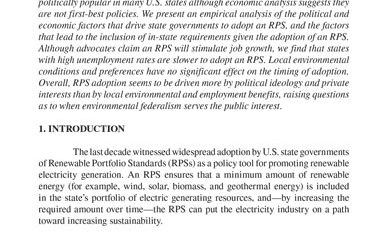Sowing doubt and undermining sciencePeople want to rely on scientific evidence in countless different contexts. As one professor put it, “Science has ‘epistemic authority,’ meaning it is the best method humans have available to understand what is true about the...
Results for research on: Policy Change
When corporations take credit for green deeds, their lobbying may tell another story
Today, most large companies like Exxon Mobil, Ford and GM issue slick reports extolling their efforts to conserve resources, use renewable energy or fund clean water supplies in developing countries. This emphasis on efforts to curb environmental harm while benefiting...
When Does it Pay for Companies to Signal that they are “Green?” – Research by Tom Lyon, Erb Institute Faculty
The prevailing wisdom says that it pays to be green. However, some research has demonstrated negative market consequences to companies’ voluntary emissions reductions. Why is this? One answer may lie in “regulator discretion.” In “Self-Regulation and Regulatory...
The Means and End of Greenwash – T. Lyon, W. Montgomery
Abstract Corporate claims about environmental performance have increased rapidly in recent years, as has the incidence of greenwash, that is, communication that misleads people into forming overly positive beliefs about an organization’s environmental practices or...
Professor Tom Lyon Shares Research on Corporate ‘Brownwashing’
Professor Tom Lyon, Erb's Associate Director of Research shares research findings on corporate 'brownwashing' in a radio interview with WEMU. Read more about the interview (pdf) or listen to the recording here.
Greenwash vs. Brownwash: Exaggeration and Undue Modesty in Corporate Sustainability Disclosure
Eun-Hee Kim, Thomas P. Lyon Abstract Corporate greenwashing has accelerated in recent years, bringing in its wake growing skepticism about corporate green claims. Although a theory of the drivers and deterrents of greenwashing has begun to emerge, it is static in...
Energy: Consider the Global Impacts of Oil Pipelines
Erb Faculty Director, Joe Arvai published in Nature (International Weekly Journal of Science) Consider the global impacts of oil pipelines. The debate over the development of the tar sands in Alberta, Canada, has long been a flashpoint for tensions in and between...
Why Do States Adopt Renewable Portfolio Standards?
Why Do States Adopt Renewable Portfolio Standards?: An Empirical Investigation Thomas P. Lyon, University of Michigan Haitao Yin, Shanghai Jiao Tong University The Energy Journal 31 by the IAEE: 131-155. Renewable portfolio standards (RPSs) for electricity generation...
Why Do States Adopt Renewable Portfolio Standards?: An Empirical Investigation
Thomas P. Lyon, Haitao Yin Abstract Renewable portfolio standards (RPSs) for electricity generation are politically popular in many U.S. states although economic analysis suggests they are not first-best policies. We present an empirical analysis of the political and...
Self-regulation, taxation and public voluntary environmental agreements
Thomas P. Lyon, Erb Faculty Member was published in the Journal of Public Economics, 87: 1453-1486. Thomas P. Lyon and John W. Maxwell (2003) Abstract An increasingly popular instrument for solving environmental problems is the ‘public voluntary agreement (VA),’ in...





